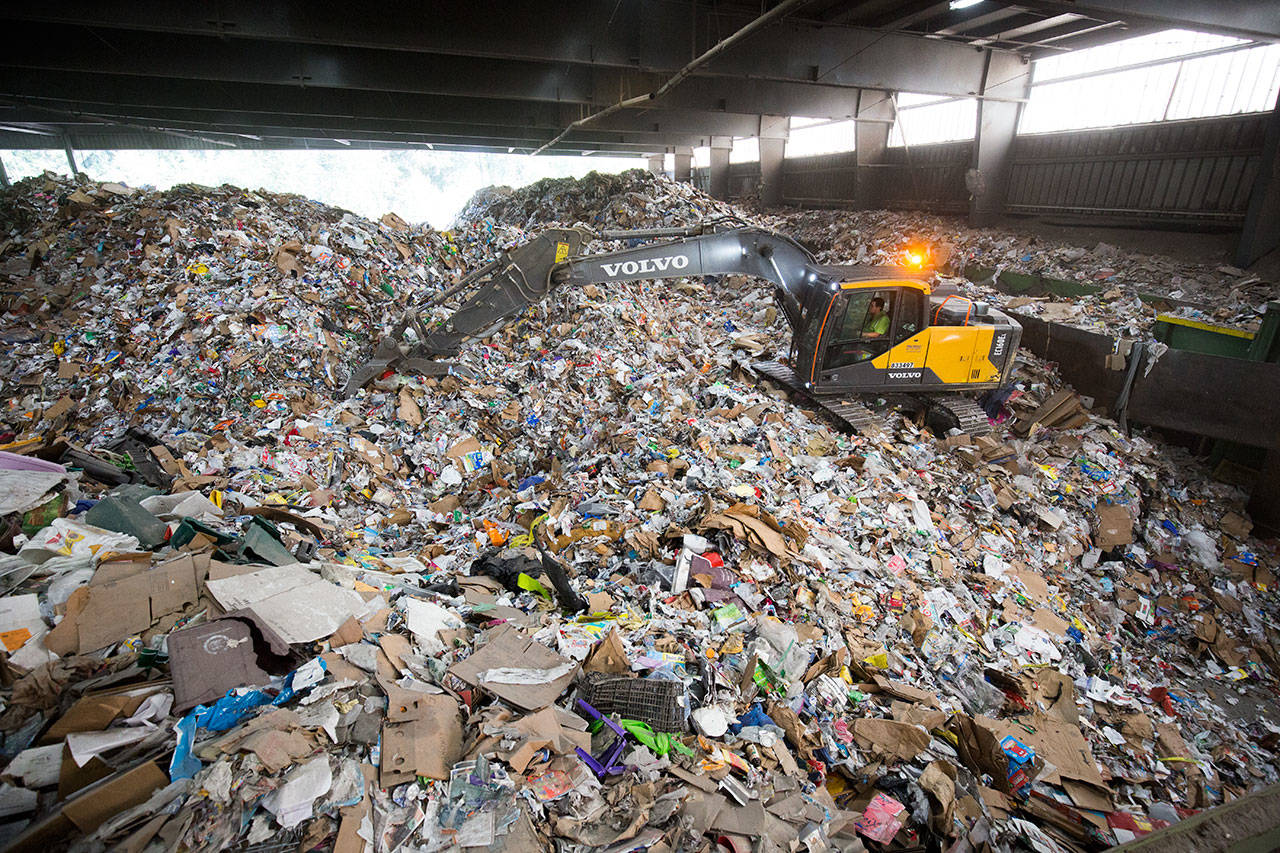By The Herald Editorial Board
Many of us are “aspirational recyclers” or are practitioners of “wish-cycling.”
But what we’re really doing sometimes — when we guess at whether what we’re about to toss can be recycled — is trashing what’s in the bin.
We want to do our part to recycle plastic, paper, glass and metals to cut down on the amount of waste that goes into the trash and then the landfill to molder away for decades if not hundreds of years. But some of what finds its way into recycle bins isn’t recyclable at all and it’s contaminating the stuff that can be recycled. That increases the costs of recycling and makes the recycled material harder to sell to those who would use it to make new packaging and other products.
And those costs are being passed on to us. Arlington and Marysville are among the latest to approve rate increases for customers of Waste Management NW. Starting in January, Arlington residential customers will pay $8.21 a month, a 68-cent increase, for recycling services as part of the garbage collection bill. Marysville recently approved a 73-cent rate increase to $5.52 a month.
Much of this follows a crackdown started at the first of the year by China, whose recycling mills have been the leading destination for those materials. For all the TVs, electronics, clothes and other goods that China sends to U.S. markets — regardless of tariffs and the trade war — we send back freighters loaded with recyclables, nearly 4,000 shipping containers a day.
Or we did, until China launched its “National Sword” policy about a year ago, which slashed the types of solid waste that were being sent to its recycling mills, including plastics and mixed paper and set higher contamination standards for what it would accept. Currently, China requires that no more than one-half of 1 percent of contaminants can be mingled in bales of recycled materials.
Those stringent conditions have meant that those collecting what we put in our recycling bins are taking more care, slowing down their lines and asking customers to think before they toss.
Waste Management NW’s Cascade Recycling Center in Woodinville each day takes in about 600 tons of what we put in recycle bins, The Herald’s Noah Haglund reported in September. Workers pick through the material as it passes by on conveyor belts, removing material that can’t be recycled, including plastic bags and other unrecyclable plastics, paper contaminated by food waste and even hazardous items like lighters and medical syringes.
The more unsuitable material tossed into recycle bins, the more time spent removing it.
It’s one argument for banning single-use plastic bags at grocery stores, an ordinance Everett’s city council recently passed and legislation that could be considered for a statewide law by the Legislature next year. After California passed its statewide ban on single-use plastic bags, recyclers reported far fewer problems with their equipment getting jammed by the bags. One San Jose recycler said the reduction in the plastic bags in the stream of recyclables reduced its down-time by half.
Some thought and more care before we recycle will help.
“Some things at this point need to be safely disposed of,” Brad Lovaas, executive director of the Washington Refuse & Recycling Association told The Herald in September. “To help us recycle right, when in doubt, throw it out.”
Among items that can’t be recycled: wet or oily paper products, waxed cardboard, rope, Christmas lights, medical waste and batteries.
Other guidelines:
Plastic, glass and metal containers should be rinsed and lids and caps should be removed and discarded.
Greasy pizza boxes and other wet or oily papers can be composted, as should shredded paper. Or tear away the uncontaminated part of the box and recycle it.
Cardboard boxes should be broken down and flattened. Most gift wrap — free of glitter — can be recycled, but remove tape, ribbon and bows and dispose of those items.
And consider the other two R’s — reduce and reuse — to cut down on what goes into the bin.
Talk to us
> Give us your news tips.
> Send us a letter to the editor.
> More Herald contact information.

























